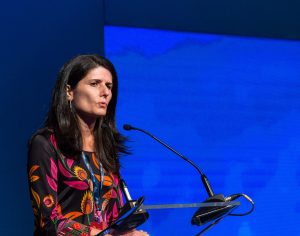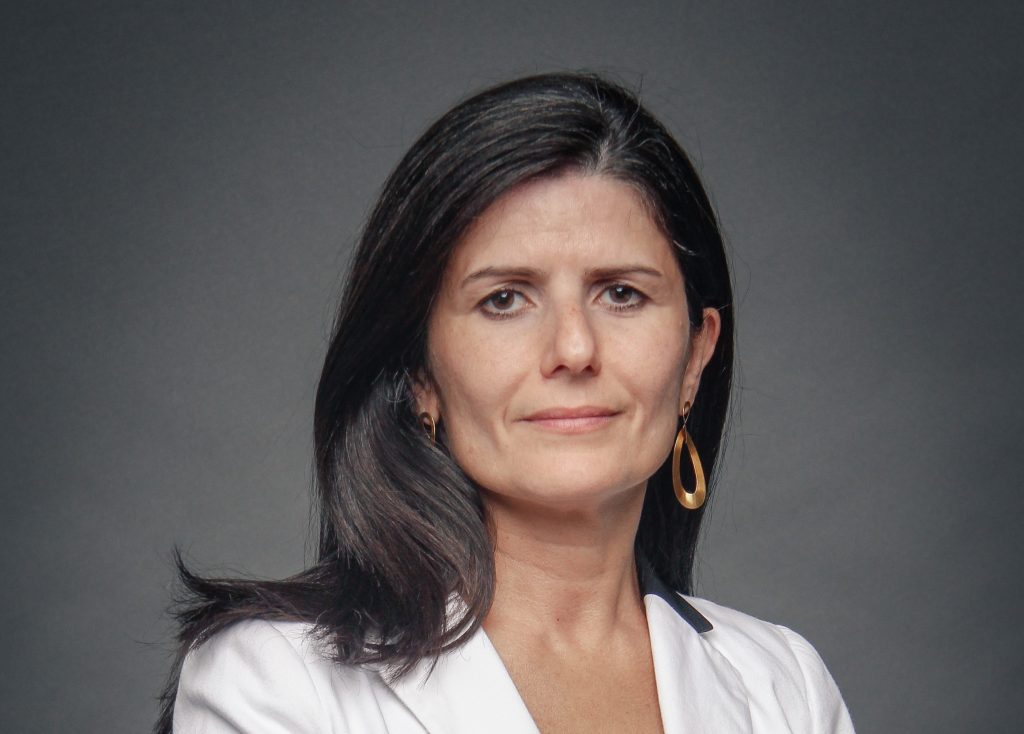São Paulo – “The choice of my career wasn’t influenced by my parents, but my focus on work was. I learned it from them,” said Zeina Latif (pictured), the chief economist with Brazilian investment firm XP Investimentos. Speaking with ANBA, this daughter to a Palestinian father and Brazilian mother of Portuguese descent discussed her family, her ties with Palestine, her work, and the scenario in Brazil.
Zeina Latif’s father Ibrahim Abdel Latif moved from Palestine to Brazil in 1958, without speaking Portuguese or knowing anyone in the country. “He was a door-to-door salesman for some time. After a while, since he was somewhat educated, he taught English lessons and started working for industrial companies. He spoke English and he’d gone to trade school. Back then Palestine was a British colony, so he had access to a good school, despite his humble background. Little by little, he built a career, but he arrived in Brazil in a situation where he had to struggle,” said Latif.
The economist is the youngest of four siblings, and said they were all treated the same at home. “What I find very admirable about my father is he didn’t treat me different on account of my being a woman. I have a brother and two sisters, and the demands were the same for all of us – whether it be school grades or being responsible, – from my father and my father. That was always a value. Seeing my parents go to work and coming home late surely was an influence. It was an inspiration to us,” she said.
Her father didn’t finish college, but her now-deceased mother Arminda Borges Latif graduated in Biology from the University of São Paulo (USP) and worked as a schoolteacher. “My father, a Muslim, converted to Christianity to marry my mother, and married a more educated woman than him. Anyone who does that displays lots of flexibility. He always taught us to care for our family roots, because there used to be and still is a lot of prejudice against Muslims and Palestinians. He taught us a straight, ethical conduct at work,” she said.
Latif was born in Campinas, where she lived before going to college for Economics at USP, where she also completed master’s and doctorate degrees in the same subject. She’s lived in São Paulo ever since. “My choosing a career as an economist was more of a result of Brazil’s economic scenario in the 1980s, a time when I was in the process of picking a profession and the news about the economy blared into our homes. Brazil was a confused country, with inflation spiraling out of control, nasty crises, and I found out that it sparked my interest,” she recalled.
“Where my parents did influence me was my focus in my professional life. Everything my father achieved was through his work, so he taught us work ethic. Despite his humble background, my father had an education. On my mother’s side, my grandparents were also very humble, and my mother left the São Paulo countryside for the capital to get an education, at a time when it wasn’t usual for women to go to college. So, of course, this work ethic and this valuing of education were key throughout my formative years,” she said.

Latif also learned to save money from her parents. “They had two different styles. Arabs are skilled in business, and the Portuguese have that European culture of being very frugal. The European are prudent, they don’t waste resources. They’ve been through wars. So I got my mother’s frugality and my father’s knack for trade. He can find a good point of sale, he has a talent for negotiations. Sadly, I didn’t inherit my father’s knack for business, but I did learn from them to think about the future,” she said.
Her work as a chief economist, according to Latif, doesn’t involve negotiating. “I’m a consultant. I make analyses, diagnoses of what’s going on in the economy, whether the scenario is more or less dangerous, what is likelier to happen, which sector might perform better, the political and international risks… That’s what I do,” she explained.
Palestine
Zeina Latif visited Palestine once, over ten years ago. “My family is quite numerous. It took four days just to meet the entire family. We kept in touch, but I plan to go back soon and see other Arab countries,” she said. Out of the 22 Arab countries, besides Palestine, Latif has also been to Jordan.
Although she didn’t learn to speak Arabic from her father, she does intend to study the language eventually. “Throughout his life, my father’s challenge was surviving, adapting to a new culture and speaking Portuguese correctly, so he wouldn’t speak Arabic with us. Only later on, in our teens, did he begin to teach us some, and my brothers married Arabs, but I didn’t, so I didn’t learn. I do speak a few words, but I’d like to learn in order to communicate better with my family. Maybe someday, when life isn’t so hectic, maybe I’ll do it,” she said.
Investing
Latif believes Brazilians need to learn to save money, to plan for old age, because they’re living longer now. Diversifying one’s investments, according to the economist, is key for boosting yields and protecting oneself through volatile times. “It’s very important to save up at this time of uncertainty. The international scenario is challenging, and domestically we have the challenge of making fiscal adjustments, since the Social Security reform alone isn’t enough. And then there’s all the questions of how to achieve sustained growth in Brazil. Right now we have lower interest rates, but this is still a risk economy,” she said.
International
The economist discussed Brazil’s trade in light of the international landscape. “We’re in a world scenario that is almost stagnant. There’s room to grow with the Arabs, but we’re in a pretty good position. Some political statements caused some friction, but I think pragmatism has prevailed in our relations, as you can see by the signing of the free trade agreement between Mercosur and the European Union. Producing in Brazil is very expensive, tough; we have the current environmental issues, and I don’t know how this will impact things. It’s a very challenging moment. It’s been hard to increase our market share, our exported volume, in a world with stagnant trade,” she stated.
Brazil Summit
Zeina Latif will participate in Brazil Summit held by British magazine The Economist in October 24. “I’ll discuss my concerns regarding this international scenario and its impact in Brazil, and also the challenges we face here for keeping up with 3.5% world growth like we managed before, and the path and its risks,” she concluded, pointing out that this occurred in both the Lula and Fernando Henrique Cardoso administrations. According to her, Brazil’s growth this year is expected to reach 1% at best.
Translated by Gabriel Pomerancblum & Guilherme Miranda




